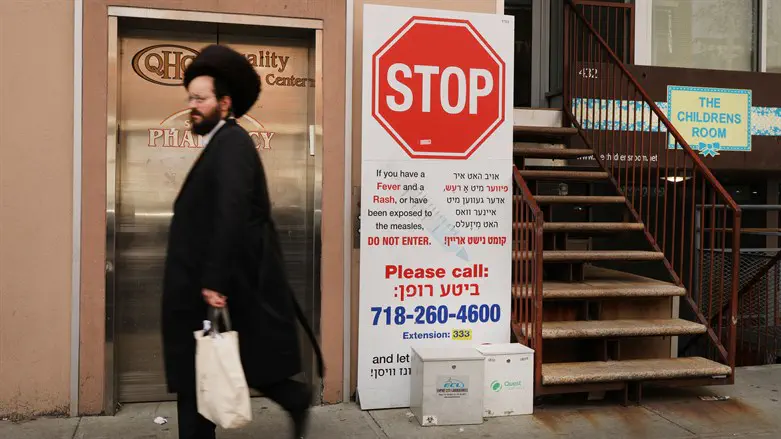
(New York Jewish Week via JTA) — Before most New Yorkers had ever heard the word “coronavirus,” another public health scare dominated local news: the measles outbreak of 2019, which shared key parallels with the pandemic to come.
In 2019, when the United States saw 1,282 reported measles cases — the highest number since 1992 — most them were concentrated in under-vaccinated Orthodox communities in New York City and its exurbs. Then as now, most Orthodox rabbis encouraged their congregants and followers to get vaccinated, while community leaders decried what they saw as an anti-Semitic focus on the idea of Jews spreading disease.
MMR (measles, mumps and rubella) vaccination rates subsequently rose in the communities, but a vocal minority of Orthodox Jews glommed onto the wider anti-vax movement. They convened audiences in Brooklyn and Monsey, New York, to rail against the imagined dangers of immunization. One of the most visible Orthodox anti-vax campaigns was a glossy, 40-page pamphlet published by an organization called Parents Educating & Advocating for Children’s Health, or PEACH.
Now, more than two years later, a detailed rebuttal to the pamphlet’s claims has come from a group of Orthodox nurses called EMES, which stands for Engaging in Medical Education with Sensitivity and is also Hebrew for “truth.” Emes was an active advocate for vaccines during the measles outbreak; its own pamphlet is cheekily called PIE, short for Parents Informed and Educated, and clocks in at 144 pages. It offers basic, fact-based information on vaccines and their benefits.
But there’s one disease it doesn’t address: COVID-19. Blima Marcus, the president of Emes who has a doctorate in nursing, said the material for PIE was actually assembled before the pandemic. However, because Emes relied on healthcare workers who were slammed for the past 18 months and aren’t paid for their work with the organization, it was only published and distributed this month.
Marcus hopes the thick document will still be timely, especially as skepticism toward COVID-19 vaccines has drawn some people into the broader anti-vax movement.
“Childhood vaccine hesitancy is huge, and I think a lot of it may have worsened with the whole pandemic of misinformation,” she told The New York Jewish Week, which one year ago chronicled her efforts to counter misinformation about COVID-19. “I think people started with COVID [vaccine] hesitancy and a lot of people kind of went off the deep end. And we also know that, due to the pandemic, a lot of regular vaccination schedules fell off the grid a little bit.”
Emes has not yet made a digital copy available, but has mailed approximately 30,000 copies to addresses in Brooklyn neighborhoods with large Orthodox populations, such as Borough Park. Marcus hopes other communities will pay Emes to send copies of the pamphlet so that the group can cover its costs.
According to a brief clip of the pamphlet that Marcus shared on Twitter, it has sections dedicated to each recommended vaccine — including statistics on their effectiveness — as well as a recommended immunization timeline. It addresses common anti-vaccine falsehoods and cites sources.
“What we’re hoping is that people realize that they’re kind of being duped and lied to by these misinformation movements,” Marcus said. “So, what I’m really hoping, is that people who have fallen down the rabbit hole or maybe started trusting the wrong sources will realize that there are answers to their questions.”
Emes has considered publishing similar material on COVID-19, but is hesitant to do so given that the pandemic’s conditions are constantly changing. Measles, by contrast, has not reappeared in the US in significant numbers since 2019.
“We’re all trying to keep our messages nuanced,” she said. “The trouble with writing something on COVID is that a lot of the data is changing, so it might be difficult to address certain issues if we write it in September and it changes by June.”
Marcus and her fellow activists have weathered harassment from anti-vaxxers for their activism, and she got a fresh wave of backlash after tweeting about the pamphlet. She knew it would come, and doesn’t expect it to stop. But she hopes the pamphlet can be a resource for people trying to convince their loved ones to trust public health guidance.
“Just this morning I was told to burn in hell,” she said. “That’s perfectly normal. During the measles outbreak we received a voicemail from someone who called us part of the Judenrat [a term for Jews forced to collaborate with the Nazis during the Holocaust], so you know, we get that, but we’ve also gotten lots of positive feedback.”